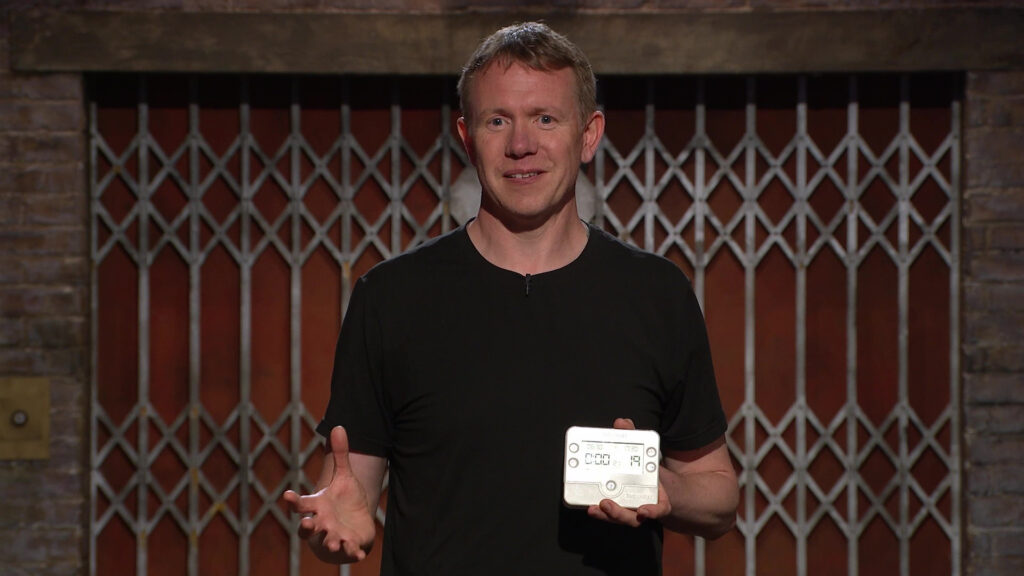A landlord entrepreneur was successful in pitching a thermostat product on the BBC’s Dragons’ Den last week – but it’s since been criticised by a tenant group for infantilising tenants.
The Timeostat (sometimes written as TIME:O:STAT) works by allowing tenants to keep their home heated at their chosen temperature for two hours at a time with two touches of a button – one hour per click.
On the show the landlord, Anthony Cherry, made a deal with entrepreneur Touker Suleyman, who invested £80,000 for a 30% stake, with that stake dropping to 20% providing he makes that money back.
But Dan Wilson Craw, deputy chief executive of tenant campaign group Generation Rent, responded: “Rather than infantilise tenants, landlords should make sure they give tenants the information they need to run the heating system in their home, and trust them to make the right decisions.
“We often hear of landlords letting out homes with bills included but then trying to limit what control the tenants have over the comfort of their own home.
“It sounds like there could be problems with this product – how easy is it to make sure your home is warm on a cold winter’s morning, or comfortable when you get in from work?
“We’d also be worried if landlords could limit heating so much that the home cannot get warm enough or even develops a mould problem as a result.”
The product also attracted an angry reaction on Twitter/X, with it being branded an ‘evil idea’, and some viewers saying it’s put them ‘off the whole programme’.
According to its inventor, Dragons’ Den chose to gloss over some details of the product, as Cherry said properties are by default kept at a minimum temperature of 14°C.
On Dragons’ Den itself though Cherry said “when that [two-hour] timer runs to zero the heating will turn off”, which gave the impression that the heating would be turned off after the boosted period.
Anthony Cherry responds – ‘the happiness of my tenants is paramount’
PropertyWire raised concerns about TIME:O:STAT to Cherry, who insisted the primary goal of the product is “to empower tenants and enable landlords to keep the bills down to offer attractive rents”.
Cherry also responded to Dan Wilson Craw of Generation Rent, saying: “I agree with Dan. Tenant comfort and welfare is a top priority for all good landlords. Unhappy tenants will not renew their tenancies.
“The timeostat is not designed to restrict the heating, but more to empower the tenants and enable them to turn it on whenever they wish without interference from the landlord.
“Many unscrupulous landlords will lock the thermostat away in a box, or turn off/down the tenants’ heating with an app. The timeostat is designed to allow tenants easy access to the heating with simple intuitive controls.”
He assured that tenants needn’t wake up to a cold house, though this depends on tenants getting up at a set schedule.
There is an auto-program function allowing two preset times when the heating comes on automatically, usually in the morning and evening. Tenants have control over this schedule, though landlords control the timespan, as it can be for one, two or three hours.
Cherry said landlords don’t have the ability to completely switch off the heating, while there is also a minimum temperature setting that defaults at 14°C.
In poorly insulated houses Cherry recommended setting the minimum temperature to 18-19°C.
The two-hour boost timespan is set as default.
Cherry said: “I’ve tried to eliminate the possibility of landlords behaving badly, so I’ve made two hours the minimum boost. I’m keen that they can’t turn the tenant’s heating off, because I think that’s wrong.
“As an experienced landlord I know that the happiness of my tenants is paramount. That’s really important – I don’t like the idea of people abusing that.”
Cherry said he utilises the timeostat in his own home, with three young children.
He added: “If it didn’t work well I’d be getting it in the neck. Even my girls who are young can turn the heating on if they want.
“The timeostat is also in my elderly parents house, where they find the controls easy to operate and welcome the savings that result.”
Timeostat modes and app
As specified on Dragons’ Den, there is ‘comfort mode’ that can be activated by landlords which enables the heating to be kept on for up to eight hours at a time, however the target temperature is lowered compared to the two-hour setting.
For the first two hours tenants can use whatever temperature they like, for three to four hours the maximum temperature drops to 21°C, and to eight hours it falls to 19°C.
There is also a ‘seasonal mode’ which removes the minimum function setting and cuts heating to a one-hour boost, though Cherry assured that it can only be activated between June and August.
A landlord app has been developed which enables them to change settings remotely, as well as monitor the temperature and humidity levels across all their properties. The app sends an alert if temperatures are dangerously high or low, while heating can be turned on remotely.
Cherry’s journey from landlord to entrepreneur
Cherry has been a landlord for 20 years, mainly letting out shared student houses.
He bought his first property in Aylesbury, Buckinghamshire. However he then started studying podiatry in Northampton as a mature student, at which point he bought a second property in Northampton and decided to rent his old home out. After that he slowly grew his portfolio of HMOs.
Once he got into the working world he felt too much heating was being wasted across his portfolio, so he developed his own time delay switch which was wired into his boiler, which he said quickly saved around 40-50% on the heating bill.
He then decided to develop his offering into a product for the commercial market.
After applying for patents he launched the product in 2016, which has sold 13,000 units to date, with some going to individual landlords and some wholesale. We are currently on the third generation of the Timeostat.
In terms of larger deals, Cherry said letting agents in York and Leeds have now installed the product across their whole portfolio, and have made using it a condition for new landlords using their services.
So far Cherry has sold products by targeting HMO landlords using Google Ads, social media, and by speaking at property investor events.
On Dragons’ Den Cherry said turnover stood at £175,000 in 2021, £181,000 in 2022, and £394,000 in 2023. Last year’s gross profit was £228,000, with a net profit of £93,000.
The next steps
Following the TV appearance, a new version of the product will come to market to cater for serviced accommodation and holiday caravans.
A fourth version of the flagship product will also launch by the end of 2024.
Timeostat costs between £169.99 and £229.99 depending on the model, roughly 10 times the cost of a regular thermostat. However Cherry claimed on Dragons’ Den that HMO landlords could make back the difference in a single month.
Prior to investing in Cherry’s venture, Touker Suleyman claimed he could put the landlord in front of people who could buy “hundreds of thousands” of units – so the company could potentially be geared up in the next few years.
The Dragons’ Den summary
When pitching on Dragons’ Den, Cherry said he first noticed there was a big problem with one of his properties on a routine maintenance call. He described a hot sunny day where the tenants weren’t at home but the heating was on “full blast” and the windows were wide open.
According to Cherry, tenants told him that using the thermostat was too complicated, so they left it on continuously. It was at this point that he developed his own product.

He said he was looking for investment on Dragons’ Den in a bid to turn this small business into a large one, while he envisaged using their contacts to help put him face-to-face with people who run holiday parks, seeing a big opportunity in holiday caravans, as well as listings on Airbnb.
One ‘Dragon’, Deborah Meaden, said she had over 1,000 units in holiday parks. However she decided against investing, saying it represents too big a capital expenditure.
Steven Bartlett decided not to invest because of a lack of interest in the HMO landlord industry, while fellow moguls Peter Jones and Sara Davies felt other thermostat developers are more likely to win the technology battle.
Touker Suleyman detailed his experience in the co-living space, as he currently has a project in West London delivering 129 units, while his partner is set to deliver 1,000 units.
Suleyman offered £80,000 for a 35% stake in Cherry’s company, dropping to 25% once making his money back.
However Cherry played hardball and successfully negotiated a deal with Suleyman at 30%, potentially dropping to 20%.
